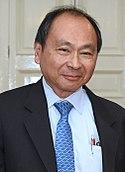Francis Fukuyama Quote
Because culture is a matter of ethical habit, it changes very slowly—much more slowly than ideas. When the Berlin Wall was dismantled and communism crumbled in 1989-1990, the governing ideology in Eastern Europe and the Soviet Union changed overnight from Marxism-Leninism to markets and democracy. Similarly, in some Latin American countries, statist or nationalist economic ideologies like import substitution were wiped away in less than a decade by the accession to power of a new president or finance minister. What cannot change nearly as quickly is culture. The experience of many former communist societies is that communism created many habits—excessive dependence on the state, leading to an absence of entrepreneurial energy, an inability to compromise, and a disinclination to cooperate voluntarily in groups like companies or political parties—that have greatly slowed the consolidation of either democracy or a market economy. People in these societies may have given their intellectual assent to the replacement of communism with democracy and capitalism by voting for democratic reformers, but they do not have the social habits necessary to make either work.
Because culture is a matter of ethical habit, it changes very slowly—much more slowly than ideas. When the Berlin Wall was dismantled and communism crumbled in 1989-1990, the governing ideology in Eastern Europe and the Soviet Union changed overnight from Marxism-Leninism to markets and democracy. Similarly, in some Latin American countries, statist or nationalist economic ideologies like import substitution were wiped away in less than a decade by the accession to power of a new president or finance minister. What cannot change nearly as quickly is culture. The experience of many former communist societies is that communism created many habits—excessive dependence on the state, leading to an absence of entrepreneurial energy, an inability to compromise, and a disinclination to cooperate voluntarily in groups like companies or political parties—that have greatly slowed the consolidation of either democracy or a market economy. People in these societies may have given their intellectual assent to the replacement of communism with democracy and capitalism by voting for democratic reformers, but they do not have the social habits necessary to make either work.
Related Quotes
About Francis Fukuyama
Fukuyama is best known for his book The End of History and the Last Man (1992), which argues that the worldwide spread of liberal democracies and free-market capitalism of the West and its lifestyle may signal the end point of humanity's sociocultural evolution and political struggle and become the final form of human government, an assessment met with numerous and substantial criticisms. In his subsequent book Trust: Social Virtues and Creation of Prosperity (1995), he modified his earlier position to acknowledge that culture cannot be cleanly separated from economics. Fukuyama is also associated with the rise of the neoconservative movement, from which he has since distanced himself.
Fukuyama has been a senior fellow at the Freeman Spogli Institute for International Studies since July 2010 and the Mosbacher Director of the Center on Democracy, Development and the Rule of Law at Stanford University. In August 2019, he was named director of the Ford Dorsey Master's in International Policy at Stanford.
Before that, he served as a professor and director of the International Development program at the School of Advanced International Studies of Johns Hopkins University. Previously, he was Omer L. and Nancy Hirst Professor of Public Policy at the School of Public Policy at George Mason University.
He is a council member of the International Forum for Democratic Studies founded by the National Endowment for Democracy and was a member of the Political Science Department of the RAND Corporation. He is also one of the 25 leading figures on the Information and Democracy Commission launched by Reporters Without Borders. In 2024 he received the Riggs Award for Lifetime Achievement in International and Comparative Public Administration.
